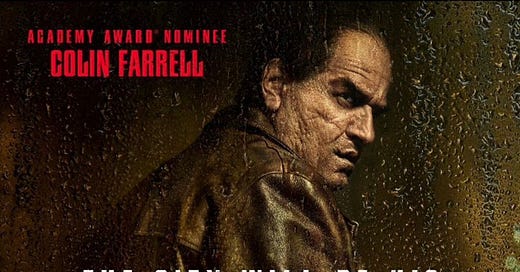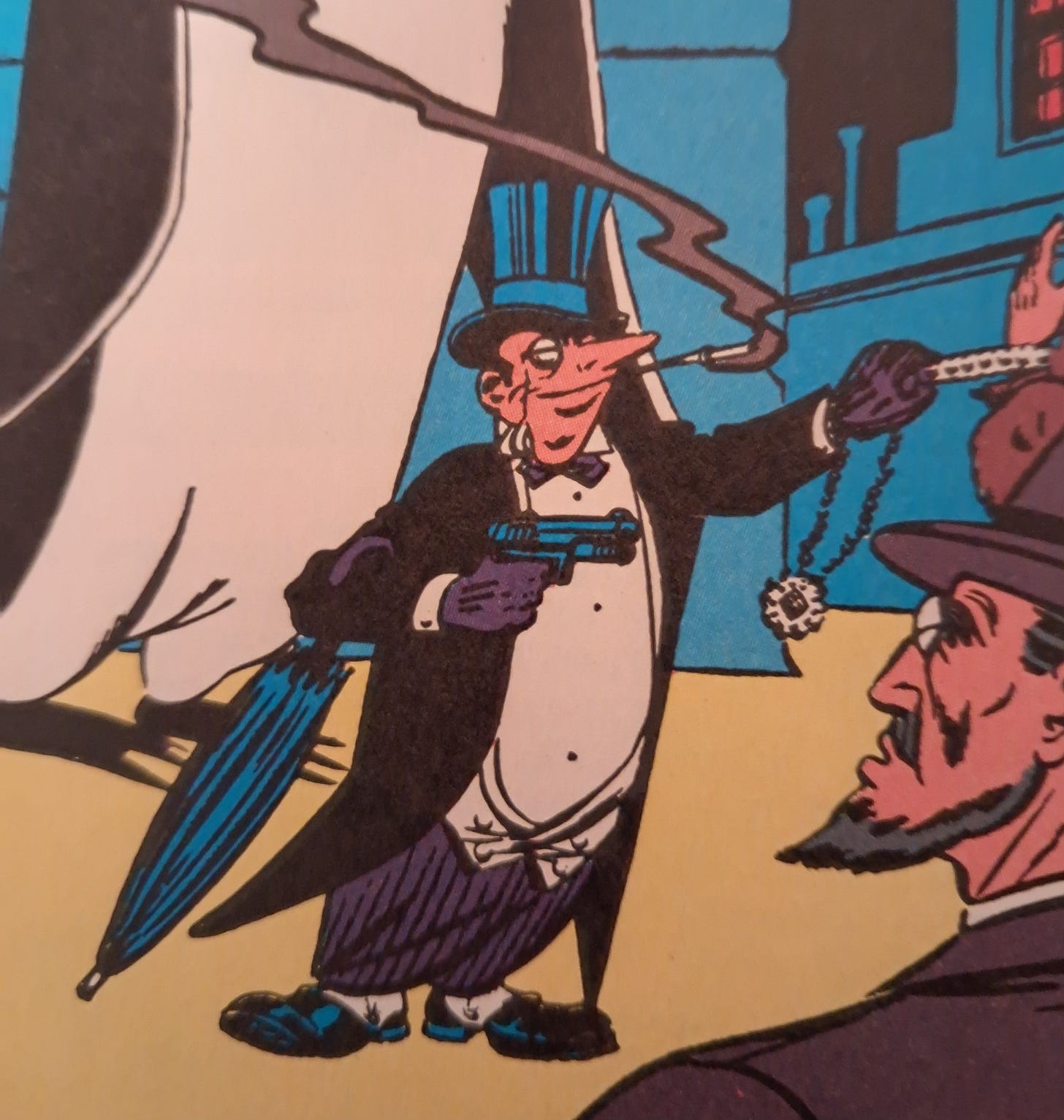I almost skipped HBO’s Penguin miniseries for the same reason I almost skipped the Joker movies. Batman has great villains, but they need to play against Batman (or at least another DC superhero).
If you want to create the next Breaking Bad, go for it. But use original characters and have a protagonist who could potentially go either way. I’d rather not watch a supervillain origin story that isn’t allowed to show the hero.
Another strike against the miniseries: The Penguin follows the events of the last Batman movie, which I was lukewarm on. Zoë Kravitz’s Catwoman was the movie’s strongest element, and I would have welcomed a miniseries about her. Colin Farrell’s Penguin, however, seemed like a mostly new character with the same name, though Farrell’s transformation into the role was certainly impressive.
Nevertheless, enough people started praising The Penguin that I got curious. And gosh darn it, it’s actually good. It’s not what I’m looking for in a Batman-related show, but taking it as its own crime drama, it works.
Oswald “Oz” Cobb isn’t exactly the Penguin we’ve known for so many decades. He talks more like a Sopranos character than the erudite, roly-poly man of culture who has plundered the comics and cartoon landscapes. But The Batman was too serious and gritty for a traditional Penguin to exist.
The Penguin is a difficult character to modernize. Comics of the current century achieved this by casting the Penguin as the owner and manager of the Iceberg Lounge, a Gotham City nightclub that draws a mix of respectable and unsavory clientele. Penguin remains a criminal, but the lounge allows him to maintain a more legitimate front. The entrepreneurial role grounds him while still giving him ample room to be a memorable character. Plus, the lounge also provides Batman or Bruce Wayne with another venue for acquiring intel.
Still, the Penguin is inherently cartoonish and built for comic book panels. This translated well into the campy 1960s Batman TV show; Burgess Meredith gave a spot-on portrayal of the classic Penguin.
But the classic Penguin didn’t even fit into the Tim Burton movies. Danny DeVito’s Penguin was almost entirely a new character, a sewer-dwelling monstrous misfit who was … oh my … raised by penguins.
Batman: The Animated Series incorporated some of the design elements from Batman Returns but otherwise returned the Penguin to his roots. Voiced by Paul Williams, this character sounded and acted like the comic book Penguin.
However, this great cartoon, which crafted definitive origin stories for so many characters, never developed an origin for the Penguin. He simply waddled onto the screen as a ready-made rogue. For the most part, it felt like the writers just pulled in the Penguin whenever they wanted to use a classic Batman villain for a story that was about something else.
An episode about a kid detective helping out Batman? Eh, let’s use the Penguin. An episode about Batman going blind? Eh, let’s use the Penguin. An episode about the mechanic who works on the Batmobile? Eh, let’s use the Penguin.
The main exception was “Birds of a Feather,” which actually was about the Penguin. He attempts to reform and enter high society, but a couple of self-centered socialites take advantage of him, using the awkward ex-con as a party trick to draw attention to themselves. It does not go well for them.
This is the series’ most sympathetic portrayal of the Penguin because it latches onto the one characteristic that most Penguins have in common: He craves respect, acceptance, and admiration.
In HBO’s The Penguin, Oz Cobb attempts to establish himself as a crime boss. The opening scene establishes the mission statement of the eight-episode miniseries, and it manages to do so without giving everything away.
(There will be some spoilers. I’ll keep it to a minimum, but read at your own risk if you haven’t yet watched the show.)
Oz meets with Alberto Falcone (Michael Zegen), who’s taking over as Oz’s new boss. They have a friendly chat, during which Oz tells Alberto about a gangster from his youth, a man who made a point to get to know the people in his neighborhood and help them in their times of need. The neighborhood came to revere this man, even throwing a parade in his honor after he died. Oz seems to be telling Alberto this to inspire him, but Alberto realizes that this is actually Oz’s dream—Oz, this strange and ugly fellow, wants to be the man people look up to and revere.
Alberto laughs, so Oz impulsively shoots and kills him, setting the whole series into motion. It’s an excellent hook.
The show then introduces a new character to represent and personify Oz’s dream. Victor (Rhenzy Feliz) is a struggling young man whom Oz takes under his wing. Oz gives the guy a job, builds up his confidence, and earns his respect. Victor has doubts along the way, and we know those doubts are justified. But Oz seems to genuinely care about him; it’s like he sees a younger version of himself in Victor.
Oz also comes across as a dutiful son initially. With everything else he has going on, he ensures that his mother, Francis (Deirdre O’Connell), is taken care of, though he is in denial of her dementia.
Cristin Milioti plays the main antagonist, Sofia Falcone, who is Alberto’s sister and the daughter of the late crime boss Carmine Falcone. Though close to her brother, Sofia otherwise does not have the warmest relationship with her family. Carmine had her framed as a murderer, and she was sentenced to endure hellish conditions in Arkham Asylum for ten years. She’s out now, and her descent into comic book villainy parallels Oz’s.
Sofia is ultimately the more tragic figure. She could have become a decent person if she wasn’t trapped in a criminal family. Oz lacked a conscience even as a child. Sofia breaks bad, but Oz was always bad. He had simply learned to hide the extent of it, and the show wisely conceals the full details until the later episodes.
Oz talks a good game about wanting to help people out. He acts like a noble creator of jobs who enables other men to provide for their families. He fashions himself as a tough but benevolent mentor to Victor.
But he doesn’t care about any of these people. He might believe he does, but he doesn’t. He needs them to love him. He craves their respect and admiration even though he’s incapable of reciprocating. And this makes Oz a more frightening figure than gimmick umbrellas ever could.
In a weird way, this fits the comics’ original description of the Penguin. The character debuted in Detective Comics #58 in 1941, and writer Bill Finger introduced him to the world with the following caption:
Crossing the path of the Batman, most feared of all crime-fighters, waddles the strange, almost ludicrous, figure of the Penguin…the umbrella man!
The jovial face of the Penguin seems to radiate good will towards all men—but behind that smiling mask lurks an evil mind!
That could almost describe the protagonist of HBO’s The Penguin … except the parts about umbrellas and crossing paths with Batman.







